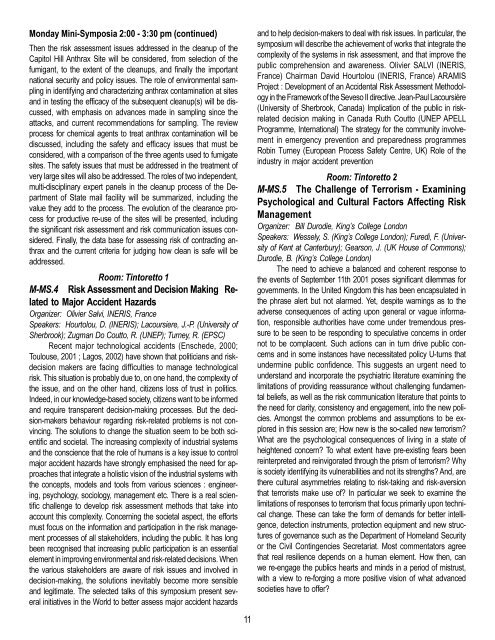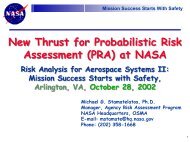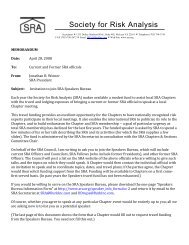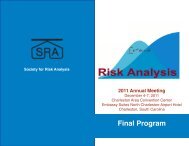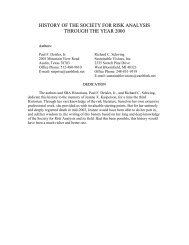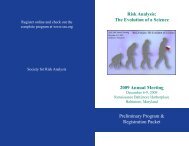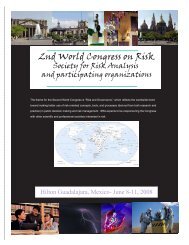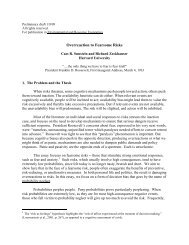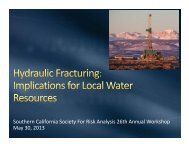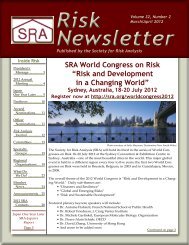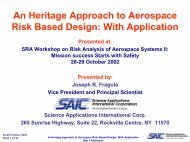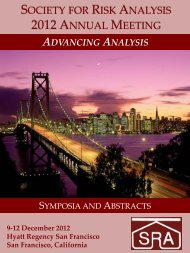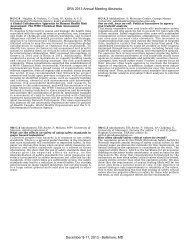Final Program World Congress on Risk - The Society for Risk Analysis
Final Program World Congress on Risk - The Society for Risk Analysis
Final Program World Congress on Risk - The Society for Risk Analysis
You also want an ePaper? Increase the reach of your titles
YUMPU automatically turns print PDFs into web optimized ePapers that Google loves.
M<strong>on</strong>day Mini-Symposia 2:00 - 3:30 pm (c<strong>on</strong>tinued)<br />
<strong>The</strong>n the risk assessment issues addressed in the cleanup of the<br />
Capitol Hill Anthrax Site will be c<strong>on</strong>sidered, from selecti<strong>on</strong> of the<br />
fumigant, to the extent of the cleanups, and finally the important<br />
nati<strong>on</strong>al security and policy issues. <strong>The</strong> role of envir<strong>on</strong>mental sampling<br />
in identifying and characterizing anthrax c<strong>on</strong>taminati<strong>on</strong> at sites<br />
and in testing the efficacy of the subsequent cleanup(s) will be discussed,<br />
with emphasis <strong>on</strong> advances made in sampling since the<br />
attacks, and current recommendati<strong>on</strong>s <strong>for</strong> sampling. <strong>The</strong> review<br />
process <strong>for</strong> chemical agents to treat anthrax c<strong>on</strong>taminati<strong>on</strong> will be<br />
discussed, including the safety and efficacy issues that must be<br />
c<strong>on</strong>sidered, with a comparis<strong>on</strong> of the three agents used to fumigate<br />
sites. <strong>The</strong> safety issues that must be addressed in the treatment of<br />
very large sites will also be addressed. <strong>The</strong> roles of two independent,<br />
multi-disciplinary expert panels in the cleanup process of the Department<br />
of State mail facility will be summarized, including the<br />
value they add to the process. <strong>The</strong> evoluti<strong>on</strong> of the clearance process<br />
<strong>for</strong> productive re-use of the sites will be presented, including<br />
the significant risk assessment and risk communicati<strong>on</strong> issues c<strong>on</strong>sidered.<br />
<str<strong>on</strong>g>Final</str<strong>on</strong>g>ly, the data base <strong>for</strong> assessing risk of c<strong>on</strong>tracting anthrax<br />
and the current criteria <strong>for</strong> judging how clean is safe will be<br />
addressed.<br />
Room: Tintoretto 1<br />
M-MS.4 <strong>Risk</strong> Assessment and Decisi<strong>on</strong> Making Related<br />
to Major Accident Hazards<br />
Organizer: Olivier Salvi, INERIS, France<br />
Speakers: Hourtolou, D. (INERIS); Lacoursiere, J.-P. (University of<br />
Sherbrook); Zugman Do Coutto, R. (UNEP); Turney, R. (EPSC)<br />
Recent major technological accidents (Enschede, 2000;<br />
Toulouse, 2001 ; Lagos, 2002) have shown that politicians and riskdecisi<strong>on</strong><br />
makers are facing difficulties to manage technological<br />
risk. This situati<strong>on</strong> is probably due to, <strong>on</strong> <strong>on</strong>e hand, the complexity of<br />
the issue, and <strong>on</strong> the other hand, citizens loss of trust in politics.<br />
Indeed, in our knowledge-based society, citizens want to be in<strong>for</strong>med<br />
and require transparent decisi<strong>on</strong>-making processes. But the decisi<strong>on</strong>-makers<br />
behaviour regarding risk-related problems is not c<strong>on</strong>vincing.<br />
<strong>The</strong> soluti<strong>on</strong>s to change the situati<strong>on</strong> seem to be both scientific<br />
and societal. <strong>The</strong> increasing complexity of industrial systems<br />
and the c<strong>on</strong>science that the role of humans is a key issue to c<strong>on</strong>trol<br />
major accident hazards have str<strong>on</strong>gly emphasised the need <strong>for</strong> approaches<br />
that integrate a holistic visi<strong>on</strong> of the industrial systems with<br />
the c<strong>on</strong>cepts, models and tools from various sciences : engineering,<br />
psychology, sociology, management etc. <strong>The</strong>re is a real scientific<br />
challenge to develop risk assessment methods that take into<br />
account this complexity. C<strong>on</strong>cerning the societal aspect, the ef<strong>for</strong>ts<br />
must focus <strong>on</strong> the in<strong>for</strong>mati<strong>on</strong> and participati<strong>on</strong> in the risk management<br />
processes of all stakeholders, including the public. It has l<strong>on</strong>g<br />
been recognised that increasing public participati<strong>on</strong> is an essential<br />
element in improving envir<strong>on</strong>mental and risk-related decisi<strong>on</strong>s. When<br />
the various stakeholders are aware of risk issues and involved in<br />
decisi<strong>on</strong>-making, the soluti<strong>on</strong>s inevitably become more sensible<br />
and legitimate. <strong>The</strong> selected talks of this symposium present several<br />
initiatives in the <str<strong>on</strong>g>World</str<strong>on</strong>g> to better assess major accident hazards<br />
11<br />
and to help decisi<strong>on</strong>-makers to deal with risk issues. In particular, the<br />
symposium will describe the achievement of works that integrate the<br />
complexity of the systems in risk assessment, and that improve the<br />
public comprehensi<strong>on</strong> and awareness. Olivier SALVI (INERIS,<br />
France) Chairman David Hourtolou (INERIS, France) ARAMIS<br />
Project : Development of an Accidental <strong>Risk</strong> Assessment Methodology<br />
in the Framework of the Seveso II directive. Jean-Paul Lacoursière<br />
(University of Sherbrook, Canada) Implicati<strong>on</strong> of the public in riskrelated<br />
decisi<strong>on</strong> making in Canada Ruth Coutto (UNEP APELL<br />
<str<strong>on</strong>g>Program</str<strong>on</strong>g>me, Internati<strong>on</strong>al) <strong>The</strong> strategy <strong>for</strong> the community involvement<br />
in emergency preventi<strong>on</strong> and preparedness programmes<br />
Robin Turney (European Process Safety Centre, UK) Role of the<br />
industry in major accident preventi<strong>on</strong><br />
Room: Tintoretto 2<br />
M-MS.5 <strong>The</strong> Challenge of Terrorism - Examining<br />
Psychological and Cultural Factors Affecting <strong>Risk</strong><br />
Management<br />
Organizer: Bill Durodie, King’s College L<strong>on</strong>d<strong>on</strong><br />
Speakers: Wessely, S. (King’s College L<strong>on</strong>d<strong>on</strong>); Furedi, F. (University<br />
of Kent at Canterbury); Gears<strong>on</strong>, J. (UK House of Comm<strong>on</strong>s);<br />
Durodie, B. (King’s College L<strong>on</strong>d<strong>on</strong>)<br />
<strong>The</strong> need to achieve a balanced and coherent resp<strong>on</strong>se to<br />
the events of September 11th 2001 poses significant dilemmas <strong>for</strong><br />
governments. In the United Kingdom this has been encapsulated in<br />
the phrase alert but not alarmed. Yet, despite warnings as to the<br />
adverse c<strong>on</strong>sequences of acting up<strong>on</strong> general or vague in<strong>for</strong>mati<strong>on</strong>,<br />
resp<strong>on</strong>sible authorities have come under tremendous pressure<br />
to be seen to be resp<strong>on</strong>ding to speculative c<strong>on</strong>cerns in order<br />
not to be complacent. Such acti<strong>on</strong>s can in turn drive public c<strong>on</strong>cerns<br />
and in some instances have necessitated policy U-turns that<br />
undermine public c<strong>on</strong>fidence. This suggests an urgent need to<br />
understand and incorporate the psychiatric literature examining the<br />
limitati<strong>on</strong>s of providing reassurance without challenging fundamental<br />
beliefs, as well as the risk communicati<strong>on</strong> literature that points to<br />
the need <strong>for</strong> clarity, c<strong>on</strong>sistency and engagement, into the new policies.<br />
Am<strong>on</strong>gst the comm<strong>on</strong> problems and assumpti<strong>on</strong>s to be explored<br />
in this sessi<strong>on</strong> are; How new is the so-called new terrorism?<br />
What are the psychological c<strong>on</strong>sequences of living in a state of<br />
heightened c<strong>on</strong>cern? To what extent have pre-existing fears been<br />
reinterpreted and reinvigorated through the prism of terrorism? Why<br />
is society identifying its vulnerabilities and not its strengths? And, are<br />
there cultural asymmetries relating to risk-taking and risk-aversi<strong>on</strong><br />
that terrorists make use of? In particular we seek to examine the<br />
limitati<strong>on</strong>s of resp<strong>on</strong>ses to terrorism that focus primarily up<strong>on</strong> technical<br />
change. <strong>The</strong>se can take the <strong>for</strong>m of demands <strong>for</strong> better intelligence,<br />
detecti<strong>on</strong> instruments, protecti<strong>on</strong> equipment and new structures<br />
of governance such as the Department of Homeland Security<br />
or the Civil C<strong>on</strong>tingencies Secretariat. Most commentators agree<br />
that real resilience depends <strong>on</strong> a human element. How then, can<br />
we re-engage the publics hearts and minds in a period of mistrust,<br />
with a view to re-<strong>for</strong>ging a more positive visi<strong>on</strong> of what advanced<br />
societies have to offer?


